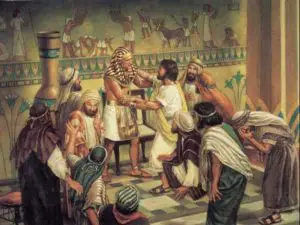The Principle of Agency in the Old Testament
The principle of agency, also known as the law of agency, is an important precept that helps us better understand, not only Scripture as a whole, but more specifically, who Jesus is, his ministry, and his relationship to God. Those who traverse the halls of academia have long known about this principle. Unfortunately, those charged with instructing the Christian in the pew either do not know about it, or they have neglected to share it with those in their care.
What then is the principle of agency? An agent is described as one who has been “authorized to act for or in the place of another.”[1] In Hebraic terms, the agent or the “one sent” is called the shaliah (also shaliach, saliah, salah[2]). The word comes from the verb shelach which means to send. James McGrath, professor and New Testament scholar writes:
Agency was an important part of every day life in the ancient world. Individuals such as prophets and angels mentioned in the Jewish Scriptures were thought of as ‘agents’ of God. And the key idea regarding agency in the ancient world appears to be summarized in the phrase from rabbinic literature so often quoted in these contexts: “The one sent is like the one who sent him.” [3] (emphasis added)
We find the principle of agency exemplified throughout Scripture. In this post we’ll explore agency in the Old Testament and review New Testament usage in future posts. It’s important to remember that a text does not necessarily have to specify that someone was “sent” per se in order for the principle to be in operation.
...
The first example ...
Eliezer, Servant of Abraham
... is found in Genesis 24. Abraham makes his servant, whom many scholars believe is Eliezer,[8] promise that the patriarch’s son, Isaac, won’t marry someone from a heathen nation. To ensure this, Abraham sends Eliezer to his ancestral country to find a wife from among his relatives. In doing so, Abraham is effectively authorizing Eliezer to act in his stead.
Biblical scholar, Marianne Meye Thompson, writes about the principle of agency and how it could be used in various legal transactions, including arranged marriages:
Biblical scholar, Marianne Meye Thompson, writes about the principle of agency and how it could be used in various legal transactions, including arranged marriages:

In the rabbinic writings there is reference to the figure of the saliah [shaliah], which literally means “one who is sent”… A saliah was a surrogate sent on a task or a mission with specific instructions and authority to carry it out. According to the Talmud, a saliah could, among other things, carry out business transactions, make binding treaties and arrange marriages. A common saying in the rabbis was “the one who is sent is like the one who sent him” or “a man’s agent is equivalent to himself.” Because the saliah may act on behalf of the one who sent him, when one deals with the saliah it is as if one is dealing with the one who sent that person.[9] (emphasis added)
According to Thompson and others, agents like Eliezer were able to act on behalf of the one who sent them because the culture viewed them as being the actual sender in a representative way.
Joseph, Son of Jacob
Another example of agency is found in the life of Joseph, son of Jacob. As a youth, Joseph was sold into slavery by his deceitful, murderous brothers. Through divine providence, however, Joseph rose to prominence as second in command in the court of the pharaoh of Egypt. When famine forced his brothers to plead for grain before the court, they unknowingly came face to face with the brother they had betrayed. One of the brothers, Judah, stood before Joseph and said, “do not be angry…for you are equal to Pharaoh” (Genesis 44:19; emphasis added). The Hebrew brothers understood that even though Joseph was not Pharaoh, he was the king’s agent and as such was seen as his equivalent. In other words, when you dealt with Joseph it was as if you were dealing with Pharaoh face to face. Amazingly, Joseph forgave his brothers because he understood that through their treachery he had become an agent, not only of Pharaoh, but of God:
 Genesis 45:4-8 (NASB) 4 Then Joseph said to his brothers, “Please come closer to me.” And they came closer. And he said, “I am your brother Joseph, whom you sold into Egypt. 5 “Now do not be grieved or angry with yourselves, because you sold me here, for God sent me before you to preserve life. 6 “For the famine has been in the land these two years, and there are still five years in which there will be neither plowing nor harvesting. 7 “God sent me before you to preserve for you a remnant in the earth, and to keep you alive by a great deliverance. 8 “Now, therefore, it was not you who sent me here, but God; and He has made me a father to Pharaoh and lord of all his household and ruler over all the land of Egypt. (emphasis added)
Genesis 45:4-8 (NASB) 4 Then Joseph said to his brothers, “Please come closer to me.” And they came closer. And he said, “I am your brother Joseph, whom you sold into Egypt. 5 “Now do not be grieved or angry with yourselves, because you sold me here, for God sent me before you to preserve life. 6 “For the famine has been in the land these two years, and there are still five years in which there will be neither plowing nor harvesting. 7 “God sent me before you to preserve for you a remnant in the earth, and to keep you alive by a great deliverance. 8 “Now, therefore, it was not you who sent me here, but God; and He has made me a father to Pharaoh and lord of all his household and ruler over all the land of Egypt. (emphasis added)
The word “sent” in each instance is the Hebrew word shalach. Joseph was sent to Egypt ultimately by God as His agent to preserve the Hebrew people.
The Angel of YAHWEH
As McGrath stated earlier, in addition to individuals, “…angels mentioned in the Jewish Scriptures were thought of as ‘agents’ of God.”[10] The Complete Word Study Dictionary of the Old Testament agrees:
“The word [salah] is used to describe God’s sending forth or away in a providential manner or purpose; even an angel or a divine messenger can be sent by God…”[11]
We see an example of an angel acting as God’s agent in one of the most well known passages from the Old Testament:
Exodus 3:1-6 (NASB) Now Moses was pasturing the flock of Jethro his father-in-law, the priest of Midian; and he led the flock to the west side of the wilderness and came to Horeb, the mountain of God. 2 The angel of YAHWEH appeared to him in a blazing fire from the midst of a bush; and he looked, and behold, the bush was burning with fire, yet the bush was not consumed. 3 So Moses said, “I must turn aside now and see this marvelous sight, why the bush is not burned up.” 4 When YAHWEH saw that he turned aside to look, God called to him from the midst of the bush and said, “Moses, Moses!” And he said, “Here I am.” 5 Then He said, “Do not come near here; remove your sandals from your feet, for the place on which you are standing is holy ground.” 6 He said also, “I am the God of your father, the God of Abraham, the God of Isaac, and the God of Jacob.” Then Moses hid his face, for he was afraid to look at God. (emphasis added)
 Verse 2 plainly tells us that the angel of YAHWEH appeared to Moses from the midst of the burning bush. The focus then changes in verse 4 from the angel in the midst of the bush to YAHWEH in the midst of the bush. Some may wonder who exactly was present in the bush. Was it the angel of YAHWEH or Yahweh or both? Some even believe it was
Verse 2 plainly tells us that the angel of YAHWEH appeared to Moses from the midst of the burning bush. The focus then changes in verse 4 from the angel in the midst of the bush to YAHWEH in the midst of the bush. Some may wonder who exactly was present in the bush. Was it the angel of YAHWEH or Yahweh or both? Some even believe it was a pre-incarnate Christ since the angel speaks in the first person–“I am the God of your father…” To resolve this dilemma we must turn to Scripture.
First, the Bible never explains or identifies Jesus as the angel of YAHWEH.
Not in this instance, nor in any other for that matter. Second, Stephen, in his sermon before the Sanhedrin, identified the being in the burning bush as an angel, not as a pre-incarnate Christ.[12] Third, the author of Hebrews writes that Jesus is not an angel:
Not in this instance, nor in any other for that matter. Second, Stephen, in his sermon before the Sanhedrin, identified the being in the burning bush as an angel, not as a pre-incarnate Christ.[12] Third, the author of Hebrews writes that Jesus is not an angel:
Hebrews 1:13 (NASB) But to which of the angels has He [God] ever said, “SIT AT MY RIGHT HAND, UNTIL I MAKE YOUR ENEMIES A FOOTSTOOL FOR YOUR FEET”?
The author’s point is that Jesus is better than the angels as evidenced, in part, because God never exalted an angel to sit at His right hand like he did Jesus. Thus,
a pre-incarnate Jesus is not the angel of YAHWEH.
a pre-incarnate Jesus is not the angel of YAHWEH.
The answer as to who was in the burning bush is found when we apply the principle of agency. It helps us understand how an angel could speak “as God.” The Encyclopedia of Jewish Religion explains agency this way:
The main point of the Jewish law of agency is expressed in the dictum, “a person’s agent is regarded as the person himself.” Therefore, any act committed by a duly appointed agent is regarded as having been committed by the principal…[13] (emphasis added)
Therefore, the angel of the LORD, as God’s agent, was to be regarded as God himself. Some scholars believe the “angel of God’s presence” spoken of later on in Exodus, as well as in the book of Isaiah,[14] is the angel that met with Moses.
Moses as an Agent of YAHWEH
In a continuation of the conversation from the burning bush, God tells Moses that He has heard the cries of His people and He is going to deliver them from Egyptian captivity:
Exodus 3:10 (NASB) “Therefore, come now, and I will send you to Pharaoh, so that you may bring My people, the sons of Israel, out of Egypt.” (emphasis added)
 Moses claims he cannot go because he is “slow of speech and slow of tongue.” YAHWEH’s anger burns against His reluctant agent:
Moses claims he cannot go because he is “slow of speech and slow of tongue.” YAHWEH’s anger burns against His reluctant agent:Exodus 4:13-16 (NASB) But he said, “Please, Lord, now send the message by whomever You will.” 14 Then the anger of YAHWEH burned against Moses, and He said, “Is there not your brother Aaron the Levite? I know that he speaks fluently. And moreover, behold, he is coming out to meet you; when he sees you, he will be glad in his heart. 15 “You are to speak to him and put the words in his mouth; and I, even I, will be with your mouth and his mouth, and I will teach you what you are to do. 16 “Moreover, he shall speak for you to the people; and he will be as a mouth for you and you will be as God to him.[15] (emphasis added)
A second time, God spoke to Moses, reiterating his commission:
Exodus 7:1 (NASB) Then YAHWEH said to Moses, “See, I make you as God to Pharaoh, and your brother Aaron shall be your prophet. (emphasis added)
How can Moses be God? This seems like blasphemy until we realize that God is the one speaking. Once again, the answer is agency. The word “God” in this exchange is elohim and it means god or God. It can be used of angels, gods, Yahweh and even humans, in particular rulers, kings and judges who serve on God’s behalf. Therefore, God sent Moses as His agent and called him elohim or god. Moses wasn’t literally Yahweh, but he would speak for God and thus be considered as God in a representative way. A.R. Johnson, Biblical scholar and author writes:
In Semitic thought this messenger-representative was conceived of as being personally-and in his very words-the presence of the sender.[16] (emphasis added)
As God’s shaliah, when Moses spoke it was like being in the very presence of the God who sent him. One scholar articulates it this way: “the Jewish principle of shaliah” corresponds to the maxim, “the one who is sent represents the full presence of the one who sends.”[17]
Elohim as God’s Agents
The last example of agency from the Old Testament that we’ll examine also refers to men serving as elohim under God. In the following passage God addresses the failure of those whom He had appointed as judges:
Psalm 82:1-7 (NASB) God takes His stand in His own congregation; He judges in the midst of the rulers [elohim]. 2 How long will you judge unjustly and show partiality to the wicked? Selah. 3 Vindicate the weak and fatherless; Do justice to the afflicted and destitute. 4 Rescue the weak and needy; Deliver them out of the hand of the wicked. 5 They do not know nor do they understand; They walk about in darkness; all the foundations of the earth are shaken. 6 I said, “You are gods [elohim], and all of you are sons of the Most High. 7 “Nevertheless you will die like men and fall like any one of the princes.” (emphasis added)
The Amplified Bible translates the text this way:
God stands in the divine assembly [of the representatives] of God; in the midst of the magistrates or judges He gives judgment [as] among the gods…6 I said, You are gods [since you judge on My behalf, as My representatives]; indeed, all of you are children of the Most High. (emphasis added)
God called those whom He had appointed to judge on His behalf, elohim or gods. They were agents sent to rule on His behalf. Like Adam [7], they were also called sons of God. They weren’t literally God, but as His representatives, they carried the same “presence” or authority when they sat to judge the people and were thus called gods or elohim.
In summary, those who are sent by God to perform a task or to take on a role on God’s behalf are called shaliah, agents and even god (elohim). As such, when they interact with those to whom they are sent, it is like “being personally…in the presence of the sender.”[18] This may be a strange concept to the Western mind, but to the Hebraic mind, it was normative. Understanding this principle helps us unlock the meaning of certain passages like the angel of YAHWEH in the burning bush and Moses being called God. We’ll see in upcoming posts how this Hebraic principle will help us make sense of New Testament passages, as well as certain aspects of Jesus and his ministry.
[1] “agent,” Merriam Webster Dictionary, accessed 06-16-19, https://www.merriam-webster.com/dictionary/agent
[2] There a numerous spelling variations, these are a few of them.
[3] James F. McGrath, The Only True God: Early Christian Monotheism in its Jewish Context, (University of Illinois Press, 2009) p. 14.
[7] Luke 3:38
[8] Genesis 15:2
[9] Marianne Meye Thompson, “Gospel of John,” in Dictionary of Jesus and the Gospels, Joel B. Green, ed. 1992 (Downers Grove, IL: Intervarsity Press, 1992), p. 377.
[10] McGrath, Ibid.
[11] “salah,” #7971, The Complete Word Study Dictionary Old Testament, Warren Baker, (Chattanooga, TN: AMG Publishers, 2003), p. 1146
[12] Acts 7:30-32
[13] “Agent” (Heb. Shaliah), The Encyclopedia of Jewish Religion, R.J.Z. Werblowsky, G. Wigoder, (New York: Adama Books, 1986), p. 15.
[14] angel of God’s presence: Exodus 23:20-23; 33:14-15; Isaiah 63:9.
[15] “as God” in Exodus 4:16 and 7:1. The word “as” is not in the original but was added by translators. It literally reads, “you will be God to him” and “make you God to Pharaoh.”
[16] Aubrey R. Johnson, The One and The Many in the Israelite Conception of God, (University of Wales Press, 1961). Quoted by Juan Baixeras in “The Blasphemy of Jesus of Nazareth.”
[17] Feasting on the Word: Year A, Volume 3, David L. Bartlett and Barbara Brown Taylor, gen. eds. (Louisville, KY; John Know Press, 2011), p. 191.
[18] Feasting on the Word, Ibid.
The above article was taken from:
One God Worship: The Principle of Agency in the Old Testament
One God Worship: The Principle of Agency in the Old Testament

